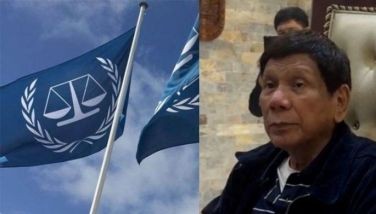Investments in peace

It’s a shame – sayang naman, I’ve been told – to let substantial investments in peace go to waste.
No one will disagree with that. But there’s no set timetable for pursuing peace, and presidents and stakeholders must be prepared to make adjustments when the process is derailed.
It’s hubris for the Aquino administration to believe that it has a monopoly on wanting peace. This process is sure to continue, whoever wins in the presidential race next year. Talking peace is good for any administration. Even if President Aquino manages what is looking more impossible with each passing day, which is to stick to his original peace blueprint and have the Bangsamoro up and running before he steps down, the next administration will likely start its own peace process, even if it has to pluck out another Islamic rebel group for talks, or revive negotiations with communist rebels.
With his peace process now an albatross around his neck, P-Noy can reassure supporters of the peace process, including foreign governments, that their investments will not go to waste, that whoever succeeds him cannot afford to abandon the peace process.
Obviously P-Noy cannot speak for the next president. But even with his trust ratings plummeting, he can still put pressure on his successor to continue pursuing peace.
* * *
The international community has always been supportive of peace initiatives. Foreign governments, especially those that are deeply engaged in the current peace process, will also not want their investments in peace to go to waste.
Canada, for example, is working with the United Nations Children’s Fund (Unicef) to discuss ways of ending the use of children in armed conflict.
Over a week ago Canadian Ambassador Neil Reeder went to Cotabato City with Unicef country representative Lotta Sylwander to meet with members of the Bangsamoro Islamic Women Auxiliary Brigade. The group is working for the implementation of an action plan to eliminate the recruitment and use of children as lookouts, couriers and fighters by the Moro Islamic Liberation Front. The MILF signed the action plan with the United Nations in 2009, committing to ensure that the group does not employ anyone under 18 as combatants or for supporting roles in armed conflict.
Canada chairs the Group of Friends of Children in Armed Conflict at the UN headquarters in New York. Ambassador Reeder told me that the MILF is trying to get out of a UN blacklist of about 30 countries and organizations that use children in armed hostilities.
Filipinos are now the fastest growing immigrant group in Canada, the ambassador told me. The embassy in Manila is Canada’s ninth biggest mission in the world, issuing 7,000 work visas annually to Pinoys. Ambassador Reeder told me that the 800,000 immigrant Filipinos in his country may soon reach a million. In 2013 alone, nearly 30,000 people who became permanent residents in Canada were from the Philippines. Tagalog (or Filipino) is now the fastest-growing language group in Canada. These numbers have made it viable for airlines to have 11 direct flights every week between the two countries – the Philippines is the only ASEAN member with non-stop air service to Canada.
This year until 2018, the Philippines will be Canada’s coordinating country for the Association of Southeast Asian Nations. In 2012, Prime Minister Stephen Harper visited the Philippines – the first by a Canadian leader in 15 years.
Since democracy was restored in 1986, Canada has poured over $731 million in official development assistance to the Philippines, with $16 million provided last year. The goal of the aid program, Ambassador Reeder told me, is to improve the investment climate and protect the economic interests of the poor to promote sustainable economic growth.
So Canada has a stake in seeing peace take root in Philippine conflict zones. Canada is working with smallholder farmers in Mindanao to boost agribusiness. It is also working with local governments to increase competitiveness in certain tourism areas to create jobs and stimulate local economic growth.
This year, the Canada Fund for Local Initiatives gave aid priority to projects that promote human rights and democratic governance as well as support a peace process and conflict resolution. Like other governments, Canada wants our peace process to succeed.
* * *
Peace, however, won’t endure if problems are swept under the rug.
If the MILF wants the Bangsamoro created as originally envisioned, its leaders may want to consider hiring a crisis PR manager.
MILF leaders don’t seem to grasp the enormity of their credibility crisis, which has pulled down the credibility of peace negotiator-in-chief President Aquino, contributing to the dramatic plunge in his trust and approval ratings.
The Senate report on the Jan. 25 police commando raid in Mamasapano, Maguindanao described it as a “massacre” and called the MILF “murderers” and “robbers” of the dead. In contrast, the police Board of Inquiry report tiptoed around this issue. Yet some senators said their own chamber’s report was still not strong enough and left out nine-tenths of the whole picture.
MILF commanders have not yet come clean on accusations, backed by photographs, that their group is operating a weapons manufacturing plant sophisticated enough to produce knockoffs of the rifle made popular by the movie “American Sniper,” the .50-caliber Barrett. Taxpayers have a right to know whether public funds are being used to bankroll an operation that could land an ordinary person behind bars for life under our gun laws.
The Senate report was quickly followed by a complaint from the Armed Forces of the Philippines that the MILF is forcibly recruiting indigenous folk and operating a training camp, in violation of the ceasefire agreement, in Iligan. The MILF has denied the accusation.
These are all happening during a ceasefire. People have reason to wonder what will happen if the MILF gets its version of the Bangsamoro. Will billions in public funds (not P75 billion in the first year, we are told, but “only” P27 billion) end up being used to create the nation’s largest armed group outside the AFP and Philippine National Police? Will taxpayers bankroll the creation of one of the world’s best havens for international terrorists?
In the light of developments since Mamasapano, these questions cannot simply be swatted away, like gnats.
Sayang naman, we’re told. But there’s such a thing as cutting one’s losses. It’s better to pull back for a thorough appraisal of the situation rather than later regretting the dire consequences of failure to ask the hard questions and demand honest answers.
Surely the country’s partners in peace will understand.
- Latest
- Trending




























